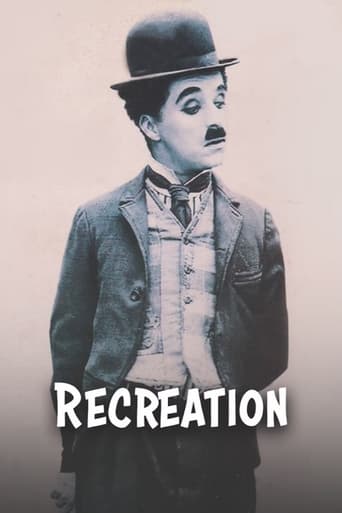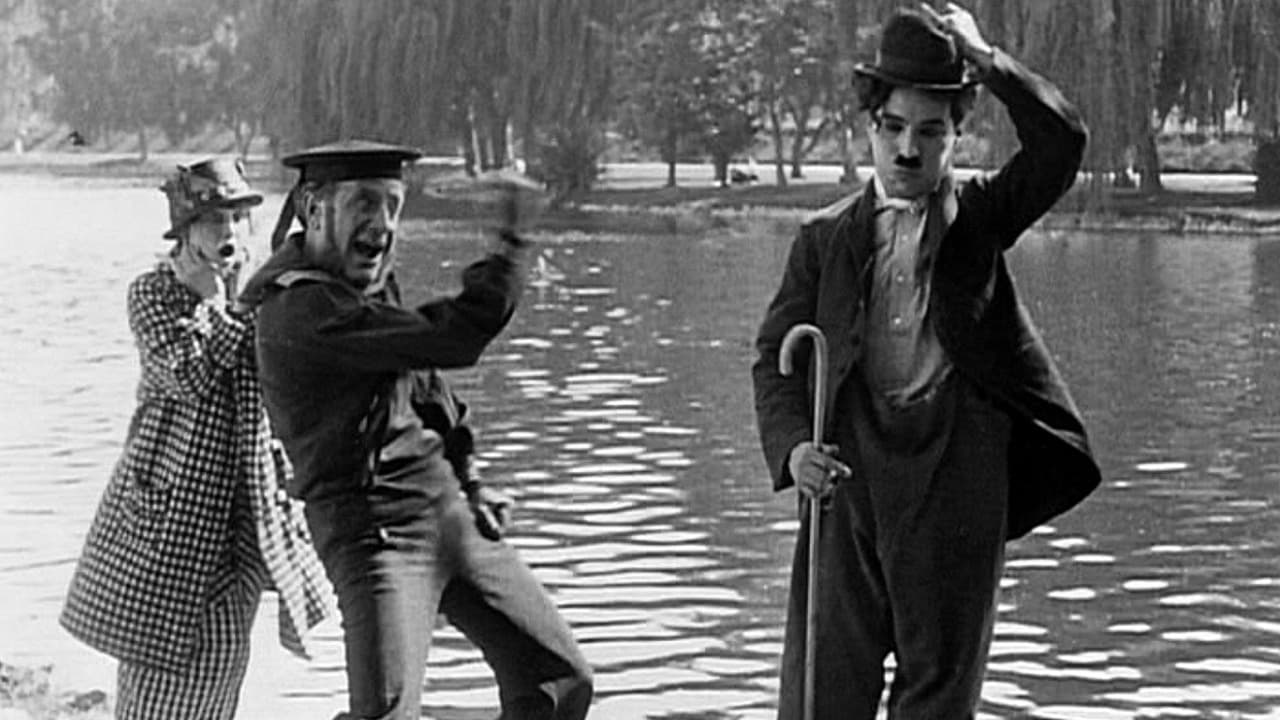TheLittleSongbird
Am a big fan of Charlie Chaplin, have been for over a decade now. Many films and shorts of his are very good to masterpiece, and like many others consider him a comedy genius and one of film's most important and influential directors. He did do better than 'Recreation', still made very early on in his career where he was still finding his feet and not fully formed what he became famous for. Can understand why the Keystone period suffered from not being as best remembered or highly remembered than his later efforts, but they are mainly decent and important in their own right. 'Recreation' is a long way from a career high (nor is it a misfire), but has good efforts and one of the average/middling efforts in the 1914 Keystone batch.'Recreation' is not as hilarious, charming or touching as his later work and some other shorts in the same period. The story is flimsy and the production values not as audacious. Occasionally, things feel a little scrappy and confused, the content is not particularly inspired and some of it is on the repetitive side.For someone who was still relatively new to the film industry and had literally just moved on from their stage background, 'Recreation' is not bad at all and there are flashes of his distinctive style, meaning that he was showing signs of evolving. While not audacious, the film hardly looks ugly, is more than competently directed and is appealingly played. Chaplin looks comfortable as his moustache-less Tramp character and shows his stage expertise while opening it up that it doesn't become stagy. Although the humour, charm and emotion was done even better and became more refined later, 'Recreation' is amusing and hard to dislike. It moves quickly and doesn't feel too long or short. Overall, average but far from a bad effort. 5/10 Bethany Cox
CitizenCaine
Chaplin tangles with a sailor for the affections of a girl, which is certainly not an original plot at this point for Chaplin. The actors are also of notably less quality than in other early Chaplin films. Before it's all said and done, there's brick-throwing, the face-slapping and ducking routine, and keystone cops getting kicked into a lake. I would be curious to find out how the fascination with brick-throwing initiated in silent films. Chaplin does have a few Chaplin-like moments: At the beginning when he tries putting his legs up over the bridge handrail, when the cop catches him about to throw a brick and he changes his demeanor instantaneously, and when using his cane to prod the behind of the girl he vied for next to the lake. This is typically what would be referred to today as one of Chaplin's "park comedies." *1/2 of 4 stars.
Michael DeZubiria
Chaplin's early short films are common targets for complaints about their simplicity and lack of real story or plot, but I think it is important to remember that the films were made at time when huge audiences wanted to see films exactly like this. Chaplin had no great directors of the past to look to for inspiration, and film itself was an emerging medium, so really the only thing he had available to him was to see what worked and what didn't work by trial and error. Bricks and punches and kicks and everyone falling into the lake made people laugh, so that's what Chaplin gave them, and it helped him to achieve the success that allowed him to bring us the truly great films of his later career, so I think it's unfair to judge these films by the same standards as what Chaplin achieved later, and it also prevents you from really enjoying these films for what they are.Audiences in 1914, for example, would have been fascinated by something as simple as one frame showing a person throwing a brick off screen, and then the next shot showing the brick flying into the screen. It is such a simple technique, but this is how movies started, and something this simple would have nearly knocked people over, because what they were looking at was really a moving picture, and one which really came to life because it moved so effortlessly around the park or the stage or the set or wherever the film took place. The important thing back then was not a moving story, but a moving picture. And if you could throw in a few punches and a few cops getting hit with bricks, so much the better.Also, if you think that it is a joke to say that a film like this was "Written and Directed by Charlie Chaplin" since there is clearly no writing or direction involved, I would argue that you have simply never considered what is involved in making a short film. Yes, Chaplin has said on numerous occasions that in those days all he needed was a cop, a pretty woman, and a park and he had the ingredients for a short film, but he didn't mean that he could get away with throwing together something that simple, he meant that that was all he needed to satisfy his audience, and any entertainer's number one concern is to give the people what they want.Since Chaplin began his career acting on stage, he was thinking about the immediate appeal to his audience, not about critics or how history would see his films. He wanted people to laugh while sitting in their seats in the theater in 1914, not in 90 years when they were watching DVD compilations of his early work. The film even seems to have been randomly titled, since "Recreation" really has absolutely nothing to do with what happens on the screen. It could even refer more to the film itself being made by Chaplin and a couple of friends just for fun than the story that unfolds on the screen.There are a couple of classic Chaplin moments in the film, such as when he tries to put both of his feet up on a fence rail, and when a police officer sees him just as he is about the throw a brick, but for the most part the film is just a raucous slapstick romp involving a girl who wanders away from her boyfriend, who falls asleep while sitting with her on a park bench, and then a fight ensues over her affections and ultimately involves a couple of cops who want to find out who's throwing bricks around.As some reviewers have noted, it seems to be a good example of what Chaplin was talking about when he said that in the old days all he needed was a cop, a girl, and a park bench and he could make a film, but I think this is a little misleading, because the film is more complex than it looks. Yes, of course the comedy is very, very simple, but it's a mistake to say there is no direction or story or plot. Scripts for silent films were very different than talking films, and while a lot of the comedy is clearly improvised, there is still more planning involved in putting something like this together than you might think.I made a few 6 or 8 minute films for film classes when I was in college, and at the time I was so proud of them I almost couldn't stand it, but looking back, it's amazing how flawed and simplistic they are, despite the hours and hours of work I put into planning and shooting and editing them. I think that in order to really enjoy Chaplin's early films for what they are (and they are certainly still enjoyable, despite the physical decay and the lack of depth or story), you have to have either made your own short films or be willing to be open minded about something that was made in a very different time for very different audiences and with very different technology. If you consider the other films that were coming out at the time, these were some of the best.
wmorrow59
On the set of Modern Times in the mid-1930s Charlie Chaplin spoke wistfully to journalist Gilbert Seldes about how, in his early days making movies, he'd simply go to the nearest park with a cop and a pretty girl and they'd make up the story as they went along. Recreation looks very much like the kind of film he was waxing nostalgic about: it's a brief, rudimentary sketch involving a rivalry between Charlie and a sailor over the sailor's girl. The fighting begins almost immediately, many bricks are thrown, cops get involved, and eventually everybody winds up in the lake. It certainly looks improvised, and I'm sure the actors had fun, but the result is little more than a few minutes of slapstick mayhem. Scripts as such were seldom used at Keystone, but if there'd been one for this movie it would have read: "Throw Brick. React. Hide Behind Tree. Grimace. Throw Brick," etc. etc. Spontaneity is the main thing Recreation has going for it; that, and brevity. I can understand why the middle-aged Chaplin felt sentimental about the simplicity of filmmaking in his early days, but the fact is, Modern Times is a great film while this one isn't. To put it another way, nostalgia for youthful spontaneity is all well and good, but there's a lot to be said for craftsmanship. The Chaplin who made Modern Times was an experienced craftsman, but the young fellow who cranked out Recreation in a park one day was still an apprentice learning his trade, and while it must have amused audiences in 1914, there isn't much here for viewers today to enjoy. Another drawback: none of the familiar Keystone players appear in support, so there's no Mabel, no Roscoe, no Chester Conklin or Edgar Kennedy to enliven the proceedings. The other actors in this movie aren't very interesting, and the guy playing the sailor in particular is a real ham.There are a couple of nice little moments, however. At the beginning Charlie is on a bridge, apparently contemplating suicide. He hoists one leg up on the railing and then the other, and swiftly falls on his butt. It's a dexterous maneuver we associate with Buster Keaton, who performed it all his life. The second moment arrives later on, when Charlie picks up a brick (yet again) to hurl at his rival the sailor. He's interrupted when a cop comes along, catching him in the act as he's about to wind up and pitch. Smoothly, instead of throwing the brick, Charlie acts as if he's examining it, appraising its condition, and then he wipes it off carefully and returns it to its original spot. In that brief bit, just for a few seconds, Chaplin demonstrates his characteristic finesse and makes viewing this short worth the time it takes to do so.


 AD
AD




